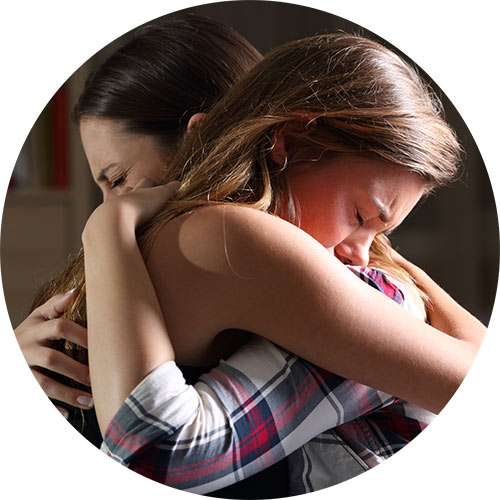Complicated Grief and Loss
As Sandra was growing up, her mother experienced multiple hospitalizations for metastasized cancer and died when Sandra was 12. Sandra didn’t really understand what was happening. Her mother was bedridden, nurses came and went, and she was constantly told to be a good girl and not to upset her mother. Homelife was sad and scary. Dad was tense, absent, and very distracted with all the hospitalizations and the need to work. Sandra’s siblings didn’t talk about what was happening, they all seemed to just scatter, and no one at school even acknowledged the death of her mom. Sandra felt invisible to the world. By age 15, she was engaged in self-harm, showing signs of disordered eating, and performing poorly in school. She entered into treatment at age 18 for major depression.
Noah’s father abused drugs and ultimately suicided at home when Noah was 12. He and his brother found him. His mother was always distraught—before and after the suicide. Noah found solace in alcohol and drugs. At age 21, Noah came to treatment after his younger brother overdosed and died on the drugs he had given him.
Losing a loved one is one of the most distressing experiences one can face. At the Claudia Black Young Adult Center we often treat young adults who have experienced a loss that is not a natural part of growing up. Most people experiencing normal grief and bereavement have a period of sorrow, numbness, and even guilt and anger but gradually these feelings ease, and it’s possible to accept the loss and move forward.
Complicated grief is like being in an ongoing, heightened state of mourning that keeps you from healing.

However, for some the feelings of loss are debilitating and don’t improve even after time passes. This is known as complicated grief, sometimes called persistent complex bereavement disorder, in which painful emotions are so long-lasting and severe that you have trouble recovering from the loss and resuming your own life. Complicated grief is like being in an ongoing, heightened state of mourning that keeps you from healing.
Many signs and symptoms of normal grief are the same as those of complicated grief. Although, while normal grief symptoms gradually start to fade over time, those of complicated grief linger or get worse.
Signs and Symptoms
Some signs and symptoms of complicated grief may include:
- Intense sorrow, pain, and rumination over the loss of your loved one
- Focus on little else but your loved one’s death
- Extreme focus on reminders of the loved one or excessive avoidance of reminders
- Intense and persistent longing or pining for the deceased
- Problems accepting the death
- Numbness or detachment
- Bitterness about your loss
- Feeling that life holds no meaning or purpose
- Lack of trust in others
- Inability to enjoy life or think back on positive experiences with your loved one
Complicated grief also may be indicated if you continue to:
- Have trouble carrying out normal routines
- Isolate from others and withdraw from social activities
- Experience depression, deep sadness, guilt or self-blame
- Believe that you did something wrong or could have prevented the death
- Feel life isn’t worth living without your loved one
- Wish you had died along with your loved one
The young adults at Claudia Black Young Adult Center, who have experienced the death of someone significant to them, are likely experiencing all of these six signs. Often these signs do not become apparent until they are living on their own and have left the home. They come into the program with a diagnosis of depression, addiction, or a multitude of trauma symptoms such as engaging in various forms of self-harm to abusive relationships.
Getting Help for Grief and Loss
Treatment at the Claudia Black Young Adult Center begins by providing emotional and physical safety, helping our young adults to feel secure in their own bodies and working on emotional regulation, through neurofeedback and a host of sensorimotor psychotherapy techniques. We help them to garner as much information as is possible to understand the dynamics of what happened that led to the death. This often means getting an educational framework for what occurs in families when someone is chronically ill, suddenly dies, or to understanding an addiction that often leads to violent acts of death. We use experiential exercises to facilitate letting go of carried guilt and shame, and often, conversations that need to be had with the deceased. We work with the young adult to honor their feelings and losses without their engaging in self-defeating behaviors and to move forward in their lives.

